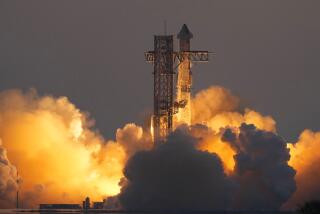Ground equipment problem marred Rocket Lab test flight in May, review says
Rocket Lab’s Electron rocket did not reach orbit in its first test launch in May because range safety officials terminated the flight due to a problem with the ground equipment used to track the launch, the company said Sunday night.
The Huntington Beach company said data showed the Electron was on track to reach orbit prior to the flight termination.
Rocket Lab said that four minutes after liftoff the ground equipment temporarily lost contact with the rocket, and based on standard operating procedures the officials terminated the launch.
Rocket Lab said the Electron has an on-board termination system that effectively shuts down the rocket’s engines.
The company said it combed through more than 25,000 channels of data during a two-month-long investigation into the launch outcome.
The review found that the rocket’s flight was terminated because of a “data loss time out” caused by a misconfiguration of telemetry equipment. That equipment was owned and operated by a third-party contractor that was supporting the launch, which took place at Rocket Lab’s private launch complex on New Zealand’s Mahia Peninsula.
Rocket Lab Chief Executive Peter Beck said it was “disappointing” to see the flight terminated “in essence due to an incorrect tick box.”
“Rocket Lab’s telemetry systems provided data verifying Electron’s capabilities and providing us with high confidence ahead of our second test flight,” he said in a statement.
The company said the fix for the issue was “simple” and that “corrective procedures” were put into place to prevent it from happening in the future. Rocket Lab said it did not make any major changes to the Electron hardware.
The company said the Federal Aviation Administration oversaw the investigation and will review the findings.
Rocket Lab’s Electron rocket reached space during the test flight in May, but did not make it to orbit as planned.
Rocket Lab said at the time that the rocket had a “great” first-stage burn, followed by clean separation of the first and second stages and ignition of the second stage. The rocket’s fairing — the clamshell-like covering that protects satellites and other payloads at the tip of the rocket — also separated as planned, but the company did not release further details about what happened after that. The Electron rocket was not carrying a satellite during the flight.
Rocket Lab said at the time that it would figure out why the rocket did not reach orbit.
Rocket Lab’s business plan focuses on ferrying small satellites into space. No date has been announced for the next flight.
Twitter: @smasunaga
More to Read
Inside the business of entertainment
The Wide Shot brings you news, analysis and insights on everything from streaming wars to production — and what it all means for the future.
You may occasionally receive promotional content from the Los Angeles Times.










